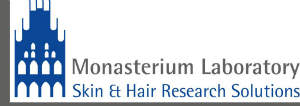
Monasterium Laboratory
Contract Research and Preclinical Services for Dermatology
Monasterium Laboratory Skin & Hair Research Solutions provides research and preclinical services for dermatology applications. The company specialises in hair, skin, wound healing, pigmentation, allergies and immunology studies, as well as stem cell research in state-of-the-art ex vivo organ culture models.
Subscribed
You have successfully submitted your enquiry. Someone from our company will respond ASAP
About Us

Monasterium Laboratory Skin & Hair Research Solutions provides research and preclinical services for dermatology applications. The company specialises in hair, skin, wound healing, pigmentation, allergies and immunology studies, as well as stem cell research in state-of-the-art ex vivo organ culture models.
Monasterium also develops custom-designed assay systems to address specific research questions to meet customer needs, in addition to individually tailored skin and hair-targeting agents as part of a discovery programme. The company has an enviable Scientific Advisory Board with consultants providing technical and commercial support across all areas of its business.
The company also works closely with the pharmaceutical industry through collaborative research projects that are aimed to identify new targets and products for skin and hair follicle care and disease.
Preclinical services for dermatological sector
Monasterium’s preclinical services include product testing, lead optimisation and compound screening using systemic or topical applications in healthy or diseased organ-cultured human skin and hair follicles.
The company also offers professional laser capture microdissection services to assess the impact of test compounds on the gene expression profile of defined cell populations/tissue compartments in human skin.
In addition, Monasterium performs gene silencing using small interfering ribonucleic acid (siRNA) in skin and hair follicle organ culture for mechanistic preclinical research in the human system.
Skin-related diseases and pathological models
Monasterium models diseases and pathological conditions, including alopecia areata, androgenetic alopecia, chemotherapy-induced alopecia, cicatricial alopecia, atopic dermatitis, psoriasis, ultraviolet (UV) damage, oxidative stress, immune privilege collapse and epithelial-mesenchymal transition (EMT).
Lead products can be further assessed in vivo in humanised mouse models of ageing, alopecia areata, androgenetic alopecia, chemotherapy-induced alopecia, psoriasis and atopic dermatitis, which utilise human skin xenotransplants in severe combined immunodeficiency (SCID) mice.
Efficacy of candidate drugs, cosmeceuticals and nutraceuticals identified in the preclinical analyses can then be assessed in Monasterium’s Clinical Hair Trials Unit.
Skin and hair follicle culture models, assays and custom services
Monasterium utilises a wide range of culture models and assays in its research activities, including:
- Human skin and hair follicle culture models
- Organ culture of diseased human skin such as lesional and non-lesional skin from patients with psoriasis, atopic dermatitis or alopecia areata
- Murine skin and hair culture models, including dorsal skin and vibrissae hair follicle organ culture
- Humanised mouse models that permit the study of human skin xenotransplants on SCID mice
- In Situ analysis and histopathology services for the analysis of human and murine skin and hair follicles, including the analysis of skin and hair follicle phenotype in knockout and wild-type mice
- Laser capture microdissection (LCM) service with PALM MicroBeam technology for contact-free and uncontaminated specimen collection from specific compartments of skin and hair follicles
- Human primary skin cell cultures such as hair follicle keratinocytes (outer root sheath), epidermal keratinocytes, hair follicle dermal papilla cells, dermal fibroblasts, epidermal and hair follicle melanocytes, adipocytes (DWAL) and immune cells
Monasterium also provides preclinical support for custom culture models and assays, from screening compound/ingredients in its human assay systems to developing custom-designed assays, proof-of-concept studies or mechanism of action research.
Readouts that can be measured in Monasterium’s assays include hair growth, hair cycling, pigmentation, cytotoxicity, cytokine secretion, quantitative immuno-histomorphometry and immunofluorescence microscopy of various markers, as well as in-situ hybridisation and phosphokinase activity of target proteins.
In addition, the company offers reverse transcription quantitative polymerase chain reaction (RT-PCR), microarrays and ribonucleic acid (RNA) sequencing analysis (RNA-seq), as well as unique downstream network modelling analysis to identify key protein regulators and mechanisms of action.
About Monasterium Laboratory
Monasterium Laboratory was founded in 2015 by Professor Ralf Paus, an internationally acclaimed physician specialising in skin and hair diseases and a world-leading hair expert. He serves as chief consultant and ensures that Monasterium is embedded into an unparalleled network of international academic collaborators.
An independent contract research laboratory, the company aims to execute cost-effective contract and collaborative research projects for the management of skin and hair aesthetics and diseases.
Contact Details
Website
Email Address
Address
Mendelstr. 17,
D - 48149 Münster,,
Germany
